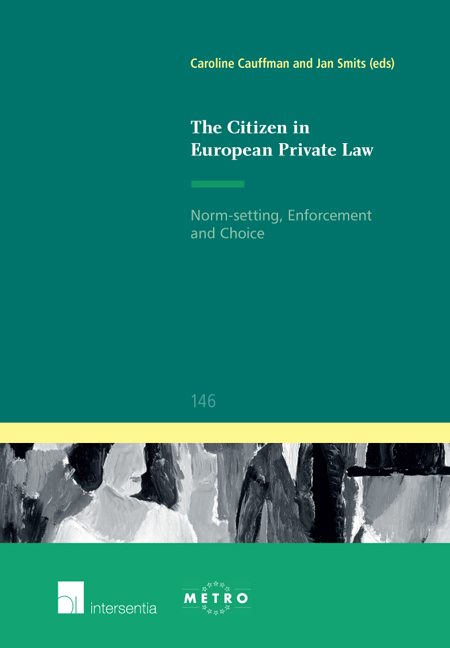Book contents
- Frontmatter
- Contents
- List of Authors
- List of Abbreviations
- Preface
- Introduction
- Part I Choice and Regulatory Competition
- Part II Norm-Setting and Enforcement
- Private Actors as Norm-Setters through Choice-of-Law: The Limits of Regulatory Competition
- Private Norm-Setting in Family Law, More Specifically: Private Norm-setting amongst Religious Communities in Family Law Issues
- Enchained Marriages: Is there a Way out?
- An Introduction to Alternative Dispute Resolution (ADR) for Consumers in Europe
- Critical Remarks on the ADR Directive
- Normative Frameworks in Commercial Dispute Resolution: The Role of Legal and Non-legal Norms in Mediation and Adjudication
- Law or Social Ordering: A Choice for Commercial Parties in Dispute Resolution? A Comment on Kornet
- Ius Commune Europaeum
Private Actors as Norm-Setters through Choice-of-Law: The Limits of Regulatory Competition
from Part II - Norm-Setting and Enforcement
Published online by Cambridge University Press: 21 September 2018
- Frontmatter
- Contents
- List of Authors
- List of Abbreviations
- Preface
- Introduction
- Part I Choice and Regulatory Competition
- Part II Norm-Setting and Enforcement
- Private Actors as Norm-Setters through Choice-of-Law: The Limits of Regulatory Competition
- Private Norm-Setting in Family Law, More Specifically: Private Norm-setting amongst Religious Communities in Family Law Issues
- Enchained Marriages: Is there a Way out?
- An Introduction to Alternative Dispute Resolution (ADR) for Consumers in Europe
- Critical Remarks on the ADR Directive
- Normative Frameworks in Commercial Dispute Resolution: The Role of Legal and Non-legal Norms in Mediation and Adjudication
- Law or Social Ordering: A Choice for Commercial Parties in Dispute Resolution? A Comment on Kornet
- Ius Commune Europaeum
Summary
Introduction
This chapter discusses the position of private actors as norm-setters in European private law. It has become increasingly recognized that regulation of private law relationships in Europe is given shape not just through the imposition of rules in a command-and-control structure with the legislator as the ultimate source of rules, but is also often governed by self-regulation by private actors. Such rules are not automatically binding law, yet are often voluntarily adopted by actors in a particular trade or industry. That means that they create a new source of norms outside the traditional framework of state legislation.
Although self-regulation has many advantages – e.g. self-regulation can benefit from expert input by the industry, it offers flexibility, and can be very effective when it stays close to, and plays into the preferences of the actors it seeks to regulate – it also poses challenges. Focusing on the function of self-regulation as a source of law in European private law, at least two aspects stand out. First, self-regulation escapes the ‘normal’ framework of democratic legitimacy and accountability of lawmakers that applies to state-based law-making. Second, looking at the substantive side of law-making, it is not immediately clear that self-regulation can ensure that fundamental aspects of the regulation of private law relationships in Europe are met, such as legal certainty or consumer protection. The fragmentation of rules across levels of regulation leads to legal uncertainty. Further, consumer protection is under pressure when it is taken outside the reach of formal legislation.
This chapter focuses on the second problem, the proliferation of law-making actors, which creates legal pluralism in European private law. Although it has been recognized that legal pluralism in European private law exists, scholarship has not come up with a consistent theoretical framework to approach the issues arising from it. Multilevel regulation has been coined as a term to describe the situation where multiple actors, either public or private, at various levels of regulation engage in activities that will directly or indirectly have legal effects. It provides an analytical tool for understanding the interplay of lawmakers in a multilevel legal order. It does not, however, give guidance on how legal pluralism can be handled so as to ensure legal certainty and consumer protection.
- Type
- Chapter
- Information
- The Citizen in European Private LawNorm-Setting, Enforcement and Choice, pp. 99 - 120Publisher: IntersentiaPrint publication year: 2016
- 1
- Cited by



